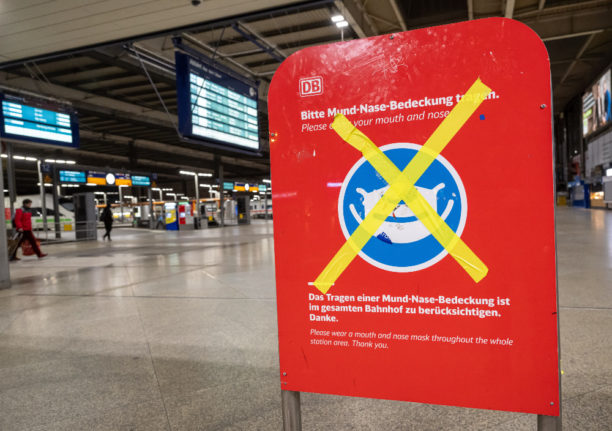Federal Health Minister Karl Lauterbach is believed to be facing strong pressure from the state health ministers to make further amendments to the Infection Protection Act that would allow them to keep rules such as 3G and 2G in place until May.
According to a draft resolution at the Health Ministers’ Conference (GMK) obtained by Tagesspiegel, the ministers are calling for a “broad and legally secure set of instruments” to allow them to tackle spiralling Covid infection rates.
The state officials say they require a legal basis “with which the measures required in each case to combat the Covid pandemic can be applied responsibly in enforcement as quickly and unbureaucratically as before.”
READ ALSO: Germany to keep Covid safeguards in place after March 20th
Specifically, the state health ministers have demanded that a transition period outlined in the Infection Protection Act be extended for “at least four weeks”.
Currently, the federal government has given states until April 2nd to remove the vast majority of remaining Covid restrictions.
Despite record-breaking infection numbers – which topped 1.5 million last week – Saturday could therefore see almost all rules being scrapped throughout the country.
States will have to rely on a base set of measures including masks on public transport and in clinics and nursing homes, but the ‘G’ rules that require things like tests and vaccination certificates for entry will be widely dispensed with.
As Lauterbach has repeatedly emphasised, a ‘hotspot’ clause written into the latest version of the Infection Protection Act allows for regions to maintain measures such as 3G and masks in shops in case of particularly high incidences.
READ ALSO: EXPLAINED: The streamlined Covid measures coming in force in Germany
However, the criteria for these hotspots is the subject of fierce debate, with Bavarian health minister Klaus Holetschek calling the guidelines “too woolly” and North Rhine-Westphalian state premier Hendrik Wust (CDU) describing them as “practically unenforceable”.
These criteria should be determined at the GMK on Monday afternoon – likely according to proposals submitted to the state health ministers by Karl Lauterbach.
According to these, an area is to be considered a hotspot if hospitals have to postpone scheduled operations, if there is a threat of emergency rooms being overloaded, if patients have to be transferred to other hospitals and if minimum staffing levels can no longer be met.
The ministers are also aiming to come to a final decision on whether a full state can be declared a Covid hotspot, or if this would apply to municipalities only. Mecklenburg Western-Pomerania and Hamburg have signalled that they want to declare themselves hotpots in order to keep stricter rules in place once the transition period is over.
The question of whether a state can be a hotspot has been the subject of disagreement at the highest levels of the traffic-light coalition, with the SPD’s Lauterbach calling for statewide rules while Justice Minister Marco Buschmann (FDP) suggesting that only smaller regions may use the ‘hotspot’ title.



 Please whitelist us to continue reading.
Please whitelist us to continue reading.
I’m shocked. I did not see this coming a mile off.
Requiring negative tests less than 24 hours old might be the only thing that works because being vaccinated and/or boosted doesn’t make a difference. Everyone in my family is boosted and the kids double vaxxed and we all still caught it last week. It doesn’t matter anymore. 2G is useless and discriminates for no good purpose. 3G only works if it’s really 1G – a negative test taken on that day. Germany has lost it’s mind.